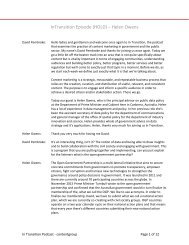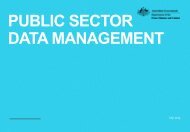enhanced-commonwealth-performance-framework-discussion-paper
enhanced-commonwealth-performance-framework-discussion-paper
enhanced-commonwealth-performance-framework-discussion-paper
Create successful ePaper yourself
Turn your PDF publications into a flip-book with our unique Google optimized e-Paper software.
Timeframe for updates<br />
It is proposed that corporate plans be required to be provided to the responsible Minister and<br />
the Finance Minister and be published by 31 August each year (starting from 2015). These<br />
would be updated as needed. While entities would determine the appropriate timeframe for<br />
updating their corporate plans, it is expected that any update would reflect significant<br />
amendments to an entity’s strategic focus, including through machinery-of-government<br />
changes, government decisions, or significant developments in any of its core corporate, human<br />
resources or financial management functions.<br />
Key questions<br />
• Would a four-year plan support medium- to long-term strategic planning<br />
• Should corporate plans be a living document and be updated as needed<br />
• Should the proposed corporate planning rule set some of the requirements for updating<br />
corporate plans<br />
• Should entities report progress against the corporate plan under Part 3 (management and<br />
accountability) of their annual reports<br />
2.3 Annual reports and annual <strong>performance</strong> statements<br />
In this section, the annual <strong>performance</strong> statement is introduced. A copy of the annual<br />
<strong>performance</strong> statement will be included in entities’ annual reports and it will report on the<br />
<strong>performance</strong> of entities’ programmes and activities. We would like you to consider what<br />
information should be included in the <strong>performance</strong> statement and how annual reports could<br />
be adapted to accommodate the <strong>performance</strong> statement.<br />
Annual reports remain a key document under the proposed <strong>enhanced</strong> Commonwealth<br />
<strong>performance</strong> <strong>framework</strong>. Section 39 of the PGPA Act requires Commonwealth entities, at the<br />
end of each reporting period, to provide a copy of an annual report to the entity’s responsible<br />
Minister, for presentation to the Parliament, on the entity’s activities during the reporting<br />
period. 6 This is consistent with existing annual reporting requirements. However, the PGPA Act<br />
now also requires all entities to include a copy of their annual <strong>performance</strong> statements in their<br />
annual reports.<br />
The annual <strong>performance</strong> statements are an important element of the proposed <strong>enhanced</strong><br />
<strong>performance</strong> <strong>framework</strong>. They are intended to ‘book-end’ <strong>performance</strong> information for all<br />
programmes and all major activities of the entity (currently proposed to be included in Portfolio<br />
Budget Statements).<br />
Under the proposed <strong>enhanced</strong> <strong>framework</strong>, the annual <strong>performance</strong> statement is where<br />
Commonwealth entities will report on what they actually achieved. The statement will<br />
summarise the <strong>performance</strong> of the programmes and activities for which the entity is<br />
responsible at the end of each reporting period. For example, entities will be expected to report<br />
on the results of planned evaluations if those planned evaluations are due in that reporting<br />
period. The level of reporting detail would be influenced by the size, nature and complexity of<br />
the programme in question.<br />
6 Sections 63(2) and 70(2) of the Public Service Act 1999 and other enabling legislation also require<br />
certain entities to produce annual reports.<br />
Enhanced Commonwealth Performance Framework—Discussion Paper | 20




